|
|
|
|
|
Dear Zinn Education Project friends,
 | | Aug. 24, 1922-Jan. 27, 2010 |
On this second anniversary of Howard Zinn's death, we share stories of how educators continue to honor his life and legacy by bringing a people's history to the classroom. We also share news of how teachers and students are fighting for the right to continue teaching a people's history in Tucson, key highlights from 2011, and our partnerships with StoryCorps' National Teachers Initiative and the Bread and Roses Centennial Committee.
The Zinn Education Project website was launched two years ago. Thanks to your donations and help with outreach, we now have more than 17,000 educators registered. We would like to acknowledge our donors and invite you to contribute so that the Zinn Education Project can continue to develop and offer resources for teaching a people's history.
|
|
|
|
|
The Zinn Education Project introduces students to a more accurate, complex, and engaging understanding of United States history than is found in traditional textbooks and curricula.
|
|
|
|
|
Bringing a people's history to the classroom
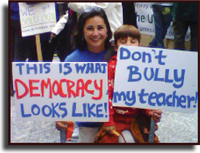 I have been teaching for 14 years and have always used A People's History in my regular U.S. History class for juniors. The students see the text as challenging, but such a breath of fresh air from the traditional texts that go along with U.S. history. The Zinn Education Project has been so helpful to access thought-provoking resources, simulations, and role plays that I can use in my classroom to reinforce the text, but also teach social justice and citizenship. ----Lindsey DiTomasso, Elmhurst, Ill., High School Social Studies Teacher I have been teaching for 14 years and have always used A People's History in my regular U.S. History class for juniors. The students see the text as challenging, but such a breath of fresh air from the traditional texts that go along with U.S. history. The Zinn Education Project has been so helpful to access thought-provoking resources, simulations, and role plays that I can use in my classroom to reinforce the text, but also teach social justice and citizenship. ----Lindsey DiTomasso, Elmhurst, Ill., High School Social Studies Teacher
| |
______________________________________________________________
|  Last week we did the People vs. Columbus, which places all the parties involved in the arrival of Columbus on trial for the murder of the Tainos. The activity was so interactive that teachers from other classrooms had to ask us to quiet down. Even though A People's History can be a bit difficult for some students, the activities on the Zinn Education Project website makes the content accessible regardless of their reading level. ----Julian Hipkins III, Washington, D.C., High School U.S. History Teacher Last week we did the People vs. Columbus, which places all the parties involved in the arrival of Columbus on trial for the murder of the Tainos. The activity was so interactive that teachers from other classrooms had to ask us to quiet down. Even though A People's History can be a bit difficult for some students, the activities on the Zinn Education Project website makes the content accessible regardless of their reading level. ----Julian Hipkins III, Washington, D.C., High School U.S. History Teacher | 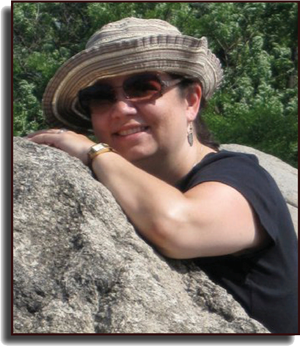 One of my favorite moments using A People's History came this year when we used a lesson about the colonial laws enacted to create division and inequality based on race. A student said, "If racism was purposefully created, it means that people can un-create it." I couldn't hope for a better realization, and it is for moments like these I am excited to continue to use materials from the Zinn Education Project in my classroom." ----Amy Piacitelli, Boston, High School Social Studies Teacher One of my favorite moments using A People's History came this year when we used a lesson about the colonial laws enacted to create division and inequality based on race. A student said, "If racism was purposefully created, it means that people can un-create it." I couldn't hope for a better realization, and it is for moments like these I am excited to continue to use materials from the Zinn Education Project in my classroom." ----Amy Piacitelli, Boston, High School Social Studies Teacher | |
______________________________________________________________
|  Howard Zinn has made me a better teacher not because he persuaded me to replace one historical narrative with another, but rather because he inspired me to add new stories to the curriculum that had been previously ignored. ----Kyle Yamada, Eugene, Oregon, High School Social Studies Teacher Howard Zinn has made me a better teacher not because he persuaded me to replace one historical narrative with another, but rather because he inspired me to add new stories to the curriculum that had been previously ignored. ----Kyle Yamada, Eugene, Oregon, High School Social Studies Teacher | |
______________________________________________________________
| 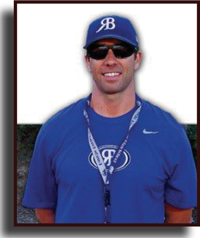 I read A People's History of the United States when I was in grad school and feel like a fire was ignited in my brain. . . . I came to the Zinn Education Project website in search of new ways to light a similar fire in my students. ----Tristan McCoy, San Diego, U.S. History Teacher and Head Football Coach I read A People's History of the United States when I was in grad school and feel like a fire was ignited in my brain. . . . I came to the Zinn Education Project website in search of new ways to light a similar fire in my students. ----Tristan McCoy, San Diego, U.S. History Teacher and Head Football Coach
|  I'm amazed by how many times I've been influenced by the life and impact of Howard Zinn's work. He's such a presence in my life. In word and action, even as he became a most honored ancestor. ---- Chinaka Hodge, Creative Writing Teacher I'm amazed by how many times I've been influenced by the life and impact of Howard Zinn's work. He's such a presence in my life. In word and action, even as he became a most honored ancestor. ---- Chinaka Hodge, Creative Writing Teacher | |
______________________________________________________________
|  The Cherokee/Seminole Removal Role Play from the Zinn Education Project took the class to a new level. Students took their roles to heart as they debated the Indian Removal Bill. My reward was seeing my students engaged in their own learning throughout the unit thanks to the readings from A People's History of the United States and the zinnedproject.org website. . . .I was beaming and I think I still am. ----Esmeralda Tello, Mastic Beach, N.Y., 7th-Grade American History The Cherokee/Seminole Removal Role Play from the Zinn Education Project took the class to a new level. Students took their roles to heart as they debated the Indian Removal Bill. My reward was seeing my students engaged in their own learning throughout the unit thanks to the readings from A People's History of the United States and the zinnedproject.org website. . . .I was beaming and I think I still am. ----Esmeralda Tello, Mastic Beach, N.Y., 7th-Grade American History | |
______________________________________________________________
|
|
2011 Highlights
_ _ _ _ _ _ _ _ _ _ _ _ _ _ _ _ _ _ _ _ _ _ _ _ _ _ _ _ _ _ _ _ _ _ _ _ _ _ _ _ _ _ |
 In summer, the Zinn Education Project became one of five national partners with StoryCorps' National Teachers Initiative. In 2012, we will launch a podcast station to honor teachers and to highlight stories of bringing a people's history to the classroom. In summer, the Zinn Education Project became one of five national partners with StoryCorps' National Teachers Initiative. In 2012, we will launch a podcast station to honor teachers and to highlight stories of bringing a people's history to the classroom._ _ _ _ _ _ _ _ _ _ _ _ _ _ _ _ _ _ _ _ _ _ _ _ _ _ _ _ _ _ _ _ _ _ _ _ _ _ _ _ _ _ | |
|  In early December, the Zinn Education Project booth had a constant stream of visitors at the National Council for the Social Studies (NCSS) 2011 Conference in Washington, D.C. In early December, the Zinn Education Project booth had a constant stream of visitors at the National Council for the Social Studies (NCSS) 2011 Conference in Washington, D.C.
The booth became a gathering place for people to share stories about teaching people's history, memories of Howard Zinn, and concerns about the obstacles to teaching outside the textbook. Read more.
_ _ _ _ _ _ _ _ _ _ _ _ _ _ _ _ _ _ _ _ _ _ _ _ _ _ _ _ _ _ _ _ _ _ _ _ _ _ _ _ _ _
| |
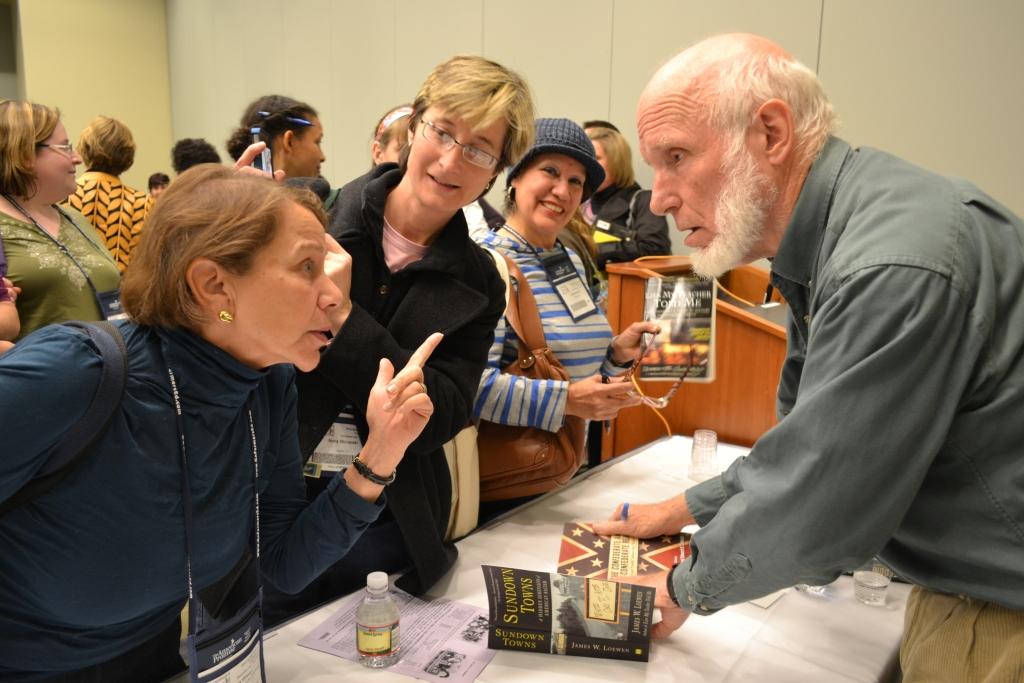 Also at the National Council for the Social Studies conference, the Zinn Education Project hosted a session with historian and author James Loewen, who spoke to a standing-room-only audience on Dec. 3. More than 140 educators filled the room to hear about his latest book, The Confederate and Neo-Confederate Reader: The "Great Truth" about the "Lost Cause." Read more. Also at the National Council for the Social Studies conference, the Zinn Education Project hosted a session with historian and author James Loewen, who spoke to a standing-room-only audience on Dec. 3. More than 140 educators filled the room to hear about his latest book, The Confederate and Neo-Confederate Reader: The "Great Truth" about the "Lost Cause." Read more.
_ _ _ _ _ _ _ _ _ _ _ _ _ _ _ _ _ _ _ _ _ _ _ _ _ _ _ _ _ _ _ _ _ _ _ _ _ _ _ _ _ _
|  As of this month, we have more than 17,000 teachers registered for the Zinn Education Project, an increase of almost 10,000 in one year. With your outreach to friends and colleagues, we can meet our new goal of 20,000.
|
_ _ _ _ _ _ _ _ _ _ _ _ _ _ _ _ _ _ _ _ _ _ _ _ _ _ _ _ _ _ _ _ _ _ _ _ _ _ _ _ _ _ |
Teaching of History Threatened in Arizona
The law passed recently against Mexican American Studies abolishes any program that has lessons that might promote resentment based on race or class.
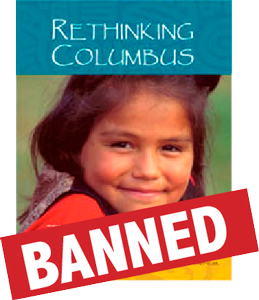 The Tucson Unified School District's removal of books from classrooms related to the Mexican American Studies program attracted national attention to this threat to the teaching of history. The Zinn Education Project partners, Rethinking Schools and Teaching for Change, have played an active role in keeping this story in the media in support of the teachers and students in Tucson. Please help us spread the word using the stories below and more that we post each day on the Zinn Education Project Facebook page. The Tucson Unified School District's removal of books from classrooms related to the Mexican American Studies program attracted national attention to this threat to the teaching of history. The Zinn Education Project partners, Rethinking Schools and Teaching for Change, have played an active role in keeping this story in the media in support of the teachers and students in Tucson. Please help us spread the word using the stories below and more that we post each day on the Zinn Education Project Facebook page.
Related Resources
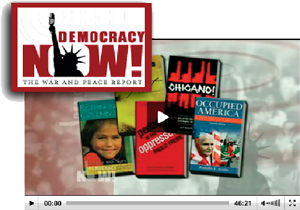 | Debating Tucson School District's Book Ban After Suspension of Mexican American Studies Program
Arizona Superintendent of Public Instruction John Huppenthal and Richard Martinez, the attorney representing teachers and students trying to save the Mexican American Studies program. Democracy Now!, Jan. 18, 2012. |  | Rethinking Columbus Banned in Tucson
Imagine our surprise. Rethinking Schools learned today that for the first time in its more-than-20-year history, our book Rethinking Columbus was banned by a school district: Tucson, Ariz. By Bill Bigelow, Rethinking Schools Blog, Jan. 13, 2012. | 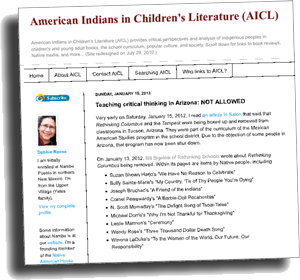 | Teaching Critical Thinking in Arizona: NOT ALLOWED
Article by Debbie Reese, American Indians in Children's Literature blog, Jan. 15, 2012. Reese's blog is updated daily with invaluable information about the fight to save the Mexican American Studies program, including analysis of the legislation, resolutions to defend Mexican American Studies, statements by noted authors, news, and more. | 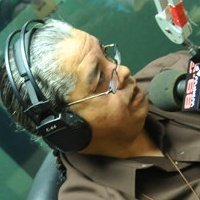 | J. Winter Nightwolf Radio Show on the
On Jan. 20, 2012, Jay Winter Nightwolf's weekly WPFW FM 89.3 program, "American Indian's Truths - Nightwolf - 'The Most Dangerous Show on Radio'" focused on the Arizona state ruling against the Mexican American Studies program in the Tucson Unified School District and the confiscation of books from Tucson classrooms. |
|
 Bread and Roses Centennial: 1912-2012 Bread and Roses Centennial: 1912-2012
One of the Great Silences in the School Curriculum
This year is the centennial of the 1912 textile workers strike in Lawrence, Mass., also known as the Bread and Roses Strike. You're unlikely to find much more than a mention of this important strike in a typical history textbook, if that. This struggle united mostly young women workers speaking dozens of languages in a dead-of-winter contest with some of the richest men in the United States. And the workers won. The Zinn Education project offers lessons and resources for teaching about the strike and an essay written for the Zinn Education Project by Norm Diamond called One Hundred Years After the Singing Strike.
The Zinn Education Project is proud to partner this year with the Bread and Roses Centennial Committee. Read more. |
|
Thank you for bringing a people's history to the classroom!
Sincerely,
Lauren Cooper
For the Zinn Education Project
|
|
|
|
|